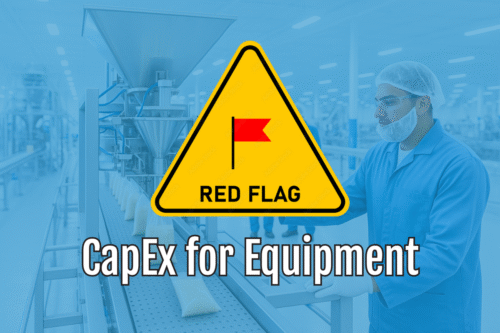Choosing a Co-Packer for Allergen Foods
 Millions of Americans have food allergies, and for those affected, the results of exposure can be life-threatening. Over the past few decades, the demand for allergen-specific foods in the U.S. and global markets has been growing.
Millions of Americans have food allergies, and for those affected, the results of exposure can be life-threatening. Over the past few decades, the demand for allergen-specific foods in the U.S. and global markets has been growing.
Today, market research reveals that 25% of Americans avoid allergens in the food they buy. For these reasons, ensuring the safety of food and beverages in the contract food packaging industry is critical.
Since co-packers play a pivotal role in the manufacturing process, companies must partner with service providers equipped to handle allergen foods. In this article, we will discuss the most important considerations involved in choosing a co-packer for allergen foods and what the co-packing process looks like.
Understanding Allergens in Food Production
An allergen is any substance that causes an adverse immune reaction in certain individuals. Keeping food products free from allergen contamination is a challenging process that requires care and expertise. Under the Food Allergen Labeling and Consumer Protection Act (FALCPA) of 2004, eight foods account for 90% of all food allergies: milk, eggs, fish, crustacean shellfish, peanuts, tree nuts, soybeans, and wheat. Facilities that manufacture or pack food products must comply with practices that eliminate cross-contamination with foods containing these allergens and ensure that potential allergens are listed on food labels.
Factors to Consider When Choosing a Co-Packer for Allergen Foods
Companies that use co-packers must ensure that their partner meets the specialized handling requirements for allergen foods. Improper handling will not only put consumers at risk but also your brand’s reputation. When seeking a co-packer for allergen foods, some important factors to consider include:
- Experience: Ensure your potential co-packing partner has a proven track record for handling allergens.
- Regulatory compliance: Co-packers must understand and adhere to stringent regulations for safe food handling. They should also hold certifications for allergen management.
- Quality control measures: The co-packer should have quality control processes in place for allergen prevention, such as testing and validation procedures.
- Facility capabilities: They must have robust measures in place to prevent cross-contamination, including equipment for allergen separation and cleaning protocols.
- References: Evaluate their history of handling allergen-specific foods by reviewing references and case studies.
- Communication: Any quality partner will build trust and transparency by communicating their allergen protocols, labeling practices, ingredient sourcing, and custom packaging design options.
The Co-Packing Process for Allergen Foods
The co-packing process for allergen foods begins with identifying the right vendor for your specific needs, whether it’s for allergen-specific or allergen-free production, packaging, and/or labeling.
Next, you’ll need to perform a thorough search process to find a co-packer with the right experience and capabilities. Conduct a detailed assessment of potential co-packers by reviewing their allergen handling protocols, examining their facility’s layout for allergen segregation, and verifying their cleaning and sanitation procedures.
Finally, you should verify that all personnel involved with production have been trained in allergen management. This should include training on how to recognize allergen sources, perform correct cleaning procedures, and prevent cross-contamination.
Collaboration and Planning for Allergen-Specific Production
After selecting a co-packer, it’s time to move into the production planning phase of your project:
- Create a customized production plan: Collaborate with your co-packer to develop a personalized plan for handling allergen concerns. This will involve outlining procedures for ingredient sourcing, handling, storage, and production in a way that prevents cross-contamination.
- Risk assessment: Conduct a risk assessment to identify points of potential allergen cross-contamination during the production process. You’ll then develop risk mitigation strategies.
Implementation of Allergen Management Plans
During your project’s co-packing process, your co-packer will implement the necessary allergen management procedures. This process includes:
- Segregation and cleaning protocols: Allergen ingredients are stringently separated and processed using dedicated tools and equipment. Robust cleaning procedures must be performed between production runs.
- Allergen testing and validation: Regular testing and verification procedures are performed to verify the cleaning procedures’ effectiveness. This includes tasks like swabbing equipment and production areas for allergen residues.
Quality Assurance and Control Throughout Production
During the production process, the co-packer should take additional steps to ensure safety and traceability:
- Continuous monitoring: The co-packer will perform continuous allergen monitoring control measures. This involves tasks like audits, inspections, and internal quality checks to ensure the established protocols are being followed.
- Traceability and documentation: Your co-packer will maintain a record of all ingredients, cleaning schedules, production processes, and testing results that occurred during your project. This information ensures traceability in case of a recall or allergen-related incident.
Allergen-Safe Co-Packing Services from Econo-Pak
Manufacturing and packaging food products under allergen-safe conditions are critical for adhering to FDA regulations and protecting consumers’ well-being. To ensure problem-free production, partner with an experienced co-packer that is knowledgeable about allergen safety.
At Econo-Pak, we maintain stringent quality control certifications and can meet your needs for allergen-safe co-packing services. For more information about our capabilities, request a quote today.
Let's start scaling.
Is your demand outpacing your ability to package your own product? Then consider outsourcing with Econo-Pak.
With over 40 years of experience working with both small brands and Fortune 500 companies, we are capable of handling your specific dry food product.
Get in touch with our team for a fixed-price quote for your project.




